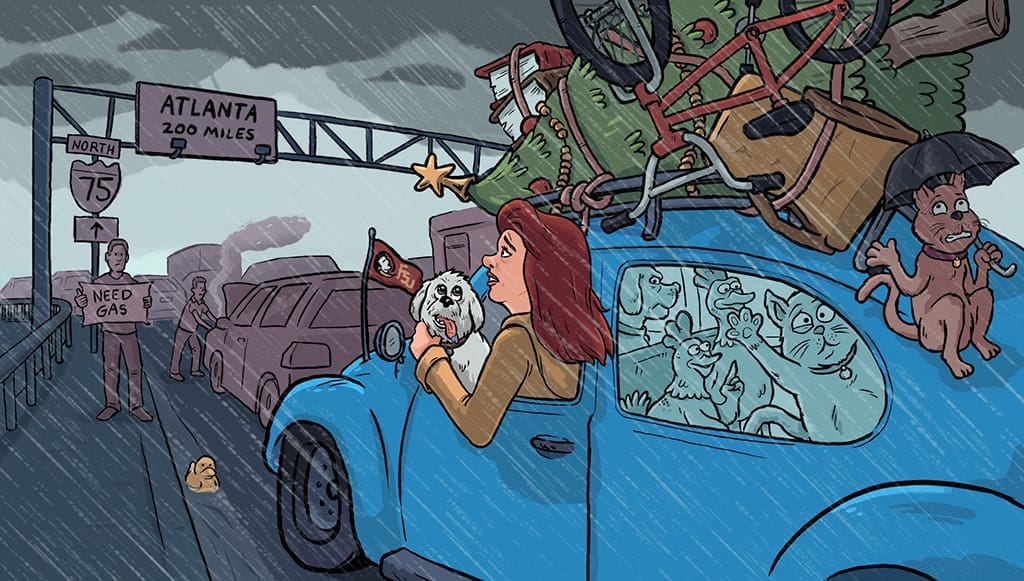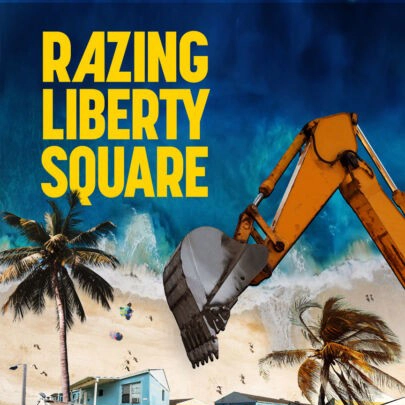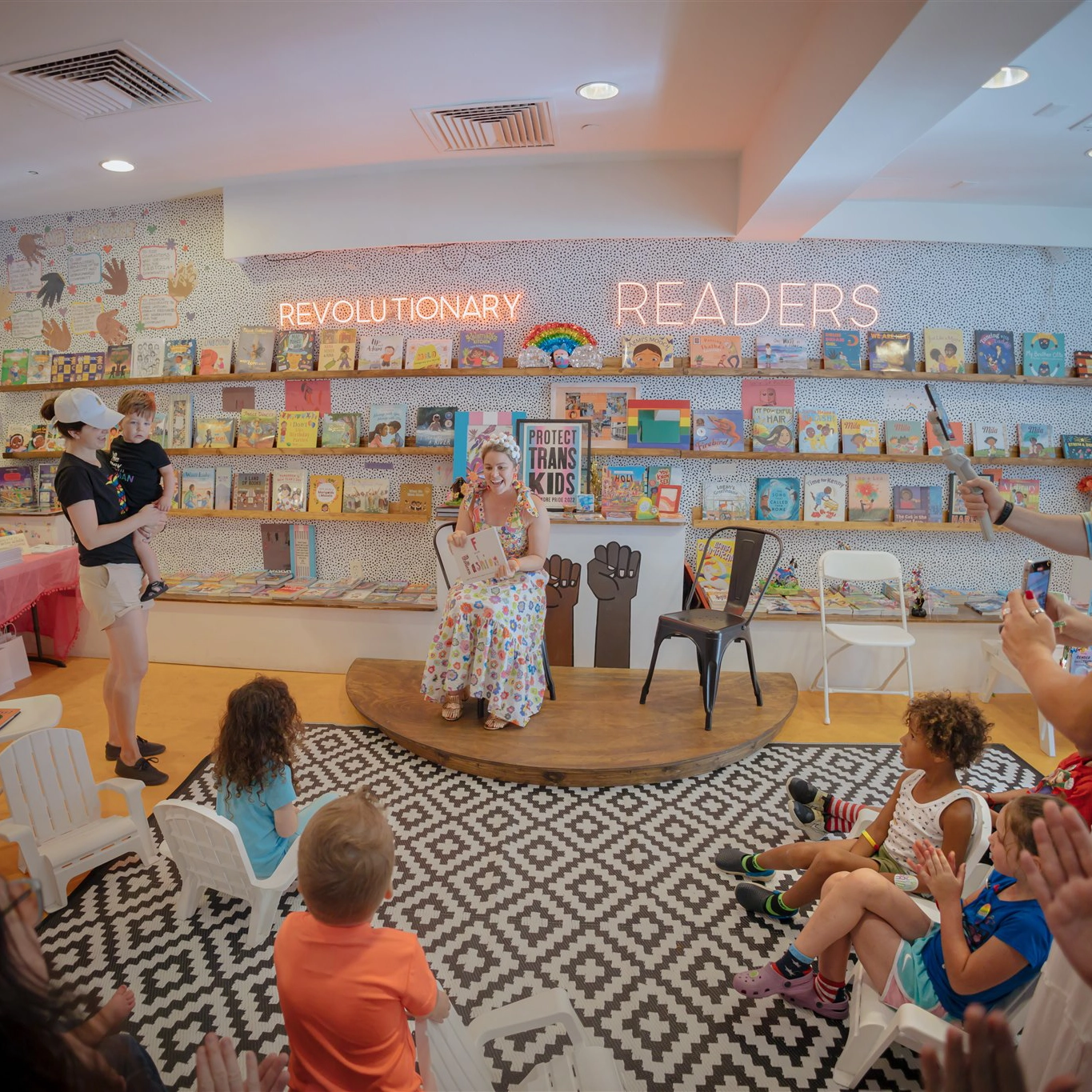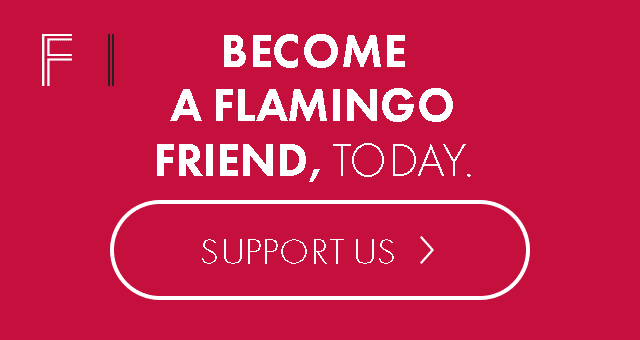by Diane Roberts | December 6, 2017
’Cane ’Cane Go Away
Now that hurricane season has come and gone, Roberts sizes up the deadly storms that have left us all a little hungover. Generations of Floridians and left us all a little storm crazy.
Here’s how we prepped for a hurricane when I was a kid in Tallahassee: First, we’d buy canned tuna, saltine crackers, Cocoa Krispies, a couple of 50-pound bags of dog kibble, a case of canned cat food, rolls of masking tape and a bale of hay. There were two dogs, two children, nine chickens, an indeterminate number of barn cats and an evil-minded pony to feed. Next, we’d fill all the bathtubs and the washing machine with water. We’d then deploy the masking tape on the windows in the iconic “starburst” pattern. And finally, we’d load the .38.

Tallahassee rarely gets a direct hit, but last year’s Hermine, which was a rain-dumping, tree-cracking bear, and Kate in 1985 were exceptions to the rule. I was at school in England during Kate—younger readers may want to note this was in the hard-to-imagine era before the internet—and the British news reported, not helpfully, “North Florida destroyed by hurricane.” I was convinced that my family was dead in the ruins of our house, the dogs were howling in grief, the pony was indifferent and all my summer clothes had blown to Alabama.
In truth, they were barbecuing pork three times a day and having a jolly time with the chainsaw.
To this day, I’m tempted to tape the windows when a hurricane heads my way, even though science tells us that’s dumb. We used to think the tape might stop the glass shattering into tiny pieces and flying around. Now we know that, if you tape the window, you might have large shards of glass, rather than small pieces, flying around. Way more dangerous. The same goes for the gun. No doubt it will soon be state law that every Floridian must own at least one firearm, but, unless you expect looters to come for your junk food stash or plan to bag a buck or bear fleeing from the rising waters, waving a piece about during a high-wind event strikes me as professional-grade stupidity.
Of course, this is Florida. The sheriff of Pasco County actually issued a warning via Twitter to people who wanted to shoot at Hurricane Irma: “You won’t make it turn around & it will have very dangerous side effects.”
Most Florida residents come from somewhere else, which can be a real problem during hurricane season. Some people simply refuse to believe that a storm can destroy everything they’ve ever known, so they haul off and buy that ill-built property on that barrier island. They’re super laid-back about the hurricane until they see a TV reporter clinging to a concrete planter on Brickell Avenue, trying not to get blown into Biscayne Bay. Then they get on Interstate 95 or I-75 and try to hightail it to Georgia, if that’s something you can do at 10 mph.
Other people panic early, which means that Lowe’s is stripped of every piece of plywood and Publix becomes a raging frenzy of freaked-out shoppers, all of whom just know it’s a matter of life and death to get the last four-pack of StarKist. It can feel like the end of civilization is at hand in Publix the week before a ’cane. All the batteries go, along with the water. I watched people toting off four or five cases of bottled H2O, even though Tallahassee’s tap water has been named the best-tasting in Florida for three straight years. One lady, discovering that every iteration of water—up to and including coconut and tonic—had sold out, punched a family-size container of ginger ale in sheer frustration, knocking it off the shelf. I suggested, gingerly, that she might fill up a bunch of plastic jugs with water, which would be cheaper anyway. She looked at me scornfully and said, “You obviously don’t understand hurricanes.”
Like what you read? Subscribe to Flamingo in print.
Ah, but nobody understands hurricanes. We know what forms them, but we can’t predict exactly where they’ll go or what they’ll do or how evil they’ll be. Yet hurricanes—like mosquitoes, flying cockroaches and idiotic politicians—are a central fact of Florida life. The peninsula has been shaped, sculpted and slapped around by hurricanes since it rose out of the sea 28 million years ago. In 1565, a hurricane hit the French Huguenot settlements of Northeast Florida, damaging Fort Caroline, wrecking ships and weakening the residents so much that the Spanish didn’t have to exert themselves much to drive their rivals out of Florida. The Great Gale of 1848 destroyed Tampa and nearby Fort Brooke. Luckily, there wasn’t much in Tampa back then. On September 17, 1928, a remarkably ferocious hurricane rearranged the land around Lake Okeechobee and unleashed a maelstrom of water. More than 2,500 people, most of them poor farm workers, died. In 1949, an Atlantic hurricane decimated the grapefruit crop. And in 2004, Hurricane Charley sliced Captiva Island in half.
So here’s a pro tip for newer Floridians: Nature bats last.
Hurricanes do whatever they damn well please. They are deities created out of warm water, warm air and the spinning of the Earth. The word comes from Hurakan, a god of the Taíno and the Maya, a bringer of storms and chaos. Maybe we’d take them more seriously if we gave them more interesting monikers. I’m tired of hurricane names that sound like my great-aunts (Irma and Hermine) or the children of Gen Xers (Emily, Olivia, and Philippe). Who wants to say, “Yeah, Harvey tore my roof off” or “I lost everything in Hurricane Vince”? If you lose everything in a hurricane named Sekhmet or Ogun, at least there’s dignity in the tragedy. How about we name hurricanes after gods and goddesses instead? Name a storm Thor, Astarte, Hades or Kali, and everybody will straighten up and maybe even stop building on wetlands and barrier islands. I burned the side of my head in 1975 sitting at the kitchen table reading Nancy Drew by candlelight. Nancy was being kept prisoner in a secret passage under the stairs of a scary old house, so I didn’t notice that I’d flicked my hair into the flame and caught it on fire. The storm was called Eloise. I’m sure I’d have handled my bald patch better if the hurricane had been named Persephone.
I’m not saying hurricane names are the problem, just that they’re a problem. From 1953 to 1979, hurricanes were handed appellations that made me think the meteorologists were getting back at their ex-wives, or that really snooty girl in college: Beryl, Donna, Betsy, Carla. Activist Roxcy Bolton of Coral Gables, a member of both the United Daughters of the Confederacy and the National Organization for Women, began protesting the practice in 1968, saying women “deeply resent being arbitrarily associated with disaster.” She finally won: In July 1979, Hurricane Bob hit Louisiana, spawned eight tornadoes, stumbled around the southeast and finally ended up in the western Atlantic, where it collapsed.
Insert your own first husband joke here.
I know, I know. I shouldn’t be making fun of life-altering weather events, not when it will take the Keys years to recover from this year’s season, not when Barbuda has pretty much been destroyed and Puerto Rico, that beautiful island claimed for Spain by Christopher Columbus in 1493, the place where the heirs of the Taíno still thrive, lies in ruins. But as Floridians—at least the ones who’ve been here longer than five minutes—understand, hurricanes provide a chance to look hard at ourselves and our rulers and decide anew what kind of people we want to be. Hurricanes also let us look around and laugh for the sheer joy of still being alive.





